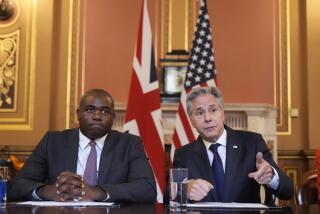China Said to Sell Pakistan Dangerous New Missiles
- Share via
WASHINGTON — In what appears to be a dramatic setback for American arms-control policies and for Sino-American relations, U.S. intelligence officials have gathered evidence that China recently exported to Pakistan dangerous new missiles that it repeatedly has promised the Bush Administration it would not sell.
According to intelligence sources, Chinese M-11 missiles showed up in Pakistan within the last two weeks. One source put the number of the missiles at about two dozen. The missiles were said to have been photographed as they passed through the Pakistani port of Karachi.
The Chinese M-11s are modern, solid-fuel, surface-to-surface missiles that are more accurate, more mobile and quicker to launch than the Scuds used by Iraq during the Persian Gulf War. They would be particularly dangerous in Pakistan because the missiles could carry nuclear warheads.
An American intelligence assessment earlier this year reportedly concluded that Pakistan has enough material to make up to 10 nuclear weapons, and Sen. Larry Pressler (R-S.D.) confirmed in an NBC News interview this week that Pakistan now has a nuclear weapons capability.
The appearance of the missiles in Pakistan also could pose serious new complications for American policy toward China just as the Bush Administration is leaving office and President-elect Bill Clinton is putting together the policies and personnel for his new Administration.
A CIA spokesman said Thursday that the arrival of the Chinese missiles in Pakistan “is something that I just can’t comment on.” Officials at China’s and Pakistan’s embassies in Washington also said that they would have no immediate comment. “I don’t know about M-11s,” a senior Pakistani diplomat said.
China began marketing its newly developed M-11 missiles and the longer-range M-9 missiles in the late 1980s. Preventing Beijing from exporting these missiles has been a main goal of the Administration’s China policy for three years, dating to National Security Adviser Brent Scowcroft’s controversial December, 1989, visit to China.
Last year, the Administration froze American exports of high-speed computers and satellite parts to China after it found that China had exported launchers for M-11 missiles to Pakistan. The sanctions were lifted after then-Secretary of State James A. Baker III, on a trip to Beijing a year ago, got what he interpreted as a pledge that China would not export the M-11 missiles to Pakistan.
Baker told a House subcommittee last February that China’s pledge was “a very substantial and significant step forward, if they will adhere to their commitment. If they don’t . . , sanctions will go right back on.”
According to sources, U.S. intelligence agencies are now scrutinizing all the available evidence concerning the missile transfer. “There are people checking it out,” one American official said. “There has been some speculation and some reporting on that. It would be a matter of real concern, obviously.”
Last spring, China agreed in writing to abide by the Missile Technology Control Regime, an international accord that prohibits the export of missiles with a range of more than 300 kilometers (about 180 miles) and a payload of more than 500 kilograms (about 225 pounds).
According to U.S. officials, the M-11 missiles, when tested in China, had a range of about 400 kilometers and a payload of 800 kilograms--specifications that would put it in clear violation of the regime.
But sources said there is now a disagreement among American intelligence officials about whether the Chinese missiles spotted in Pakistan amount to a violation of the accord. Some American officials have argued it is possible that, before exporting the missiles, China modified them to limit their range and payload so they would comply with the accord.
Under a federal law passed in 1990, if American officials conclude that the missiles in Pakistan violate the regime, the U.S. government would be required to retaliate by imposing some new economic sanctions against China--or at least against the Chinese units or enterprises that exported the M-11s.
Gary Milhollin, director of the Wisconsin Project on Nuclear Arms Control, said that--if Pakistan obtains a missile capable of carrying a payload of 800 kilograms--”it’s certainly big enough to carry a nuclear warhead.” With such a missile, Milhollin said, Pakistan “is going to be able to do substantial damage to India.”
In talks with the Administration over the last few years, Chinese officials have acknowledged concluding a deal to sell the M-11 missiles to Pakistan--arguing that the contract was signed before China was subject to the Missile Technology Control Regime. However, during Baker’s trip to Beijing last year, China agreed that the regime’s guidelines and parameters cover the M-11s.
It is not clear why China would choose this time to export the missiles to Pakistan. An American official said one theory is that China is retaliating, in its fashion, for the Administration’s decision last September to approve the sale of advanced F-16 warplanes to Taiwan. Another theory is that China is taking advantage of the American presidential transition.
“Maybe they thought now is the time they could get away with it,” a U.S. official speculated.
But from China’s point of view, the export of the missiles would also appear to be risky. It could increase the pressure on the incoming Administration to adopt a tough stand on China at just the time when newly appointed officials are formulating new policies.
It also could embitter outgoing Bush Administration officials, who have pointed to China’s earlier restraint on the M-11 missiles as one of the most important successes for the President’s policy of dialogue and reconciliation with China after the 1989 crackdown on pro-democracy demonstrations in Beijing.
More to Read
Sign up for Essential California
The most important California stories and recommendations in your inbox every morning.
You may occasionally receive promotional content from the Los Angeles Times.













